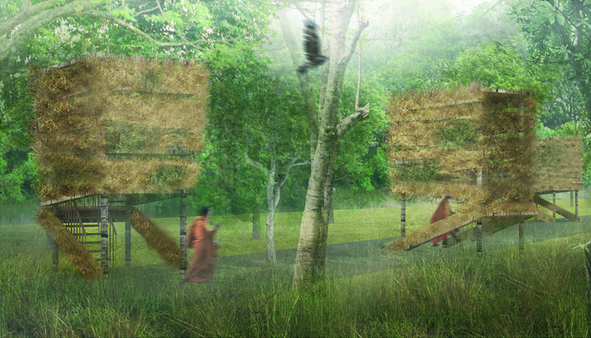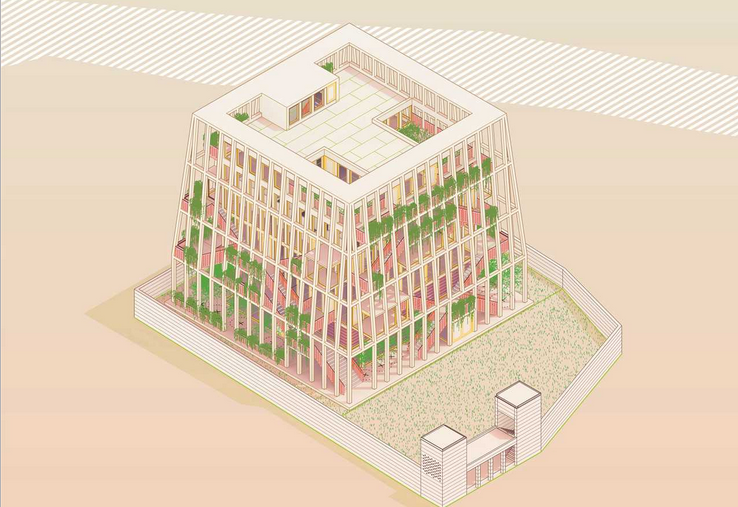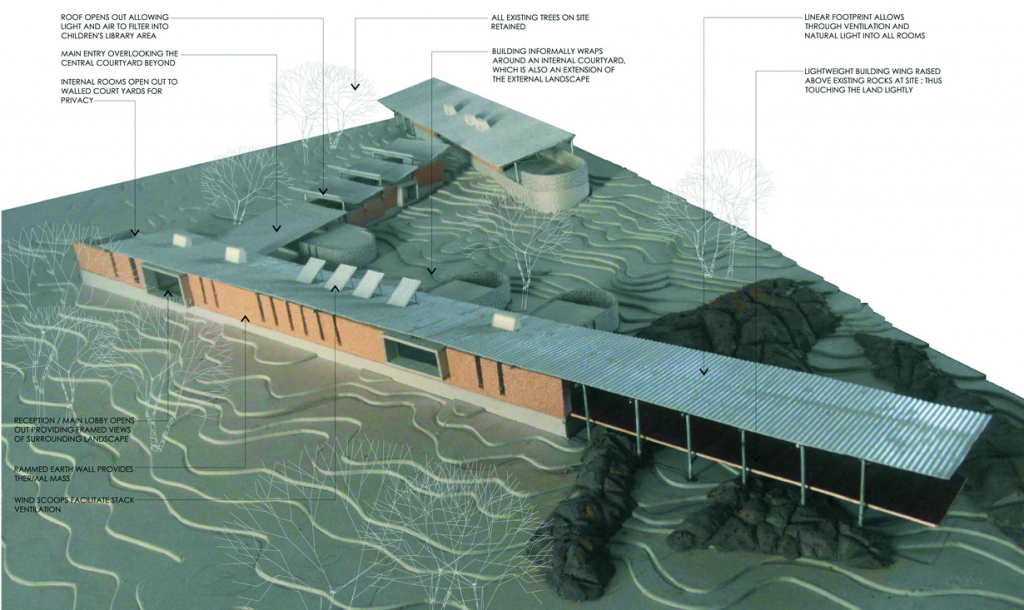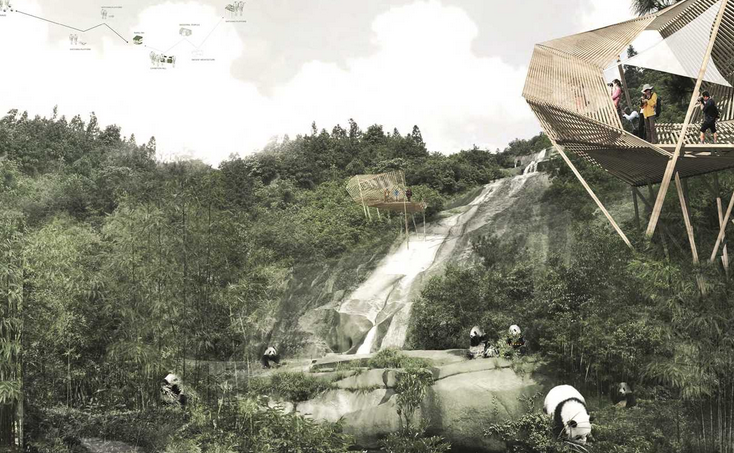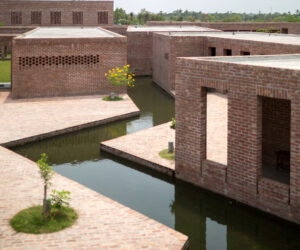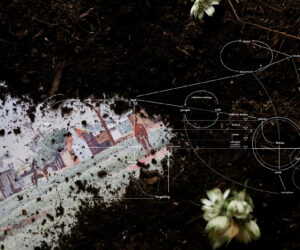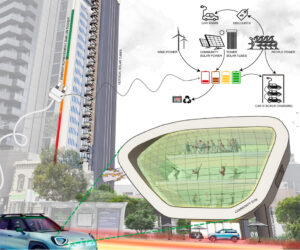Holcim Awards 2014 prize-winning projects, Asia Pacific
The winning projects of the Holcim Awards 2014 Asia Pacific show how building with sustainable construction in mind can enhance the region’s human, natural and economic performance. A bird sanctuary in Thailand, a locally-adapted orphanage in Nepal, and a community library in Sri Lanka received the top prizes.
An independent jury led by Rahul Mehrotra (India) selected the winners using the “target issues” for sustainable construction that include the “triple bottom line” of environmental, social and economic performance, and also recognize the need for architectural excellence and a high degree of transferability. 13 projects to be implemented in nine countries in the Asia Pacific region were recognized with a total of USD 330,000 prize money.
Gold to a bird sanctuary in Thailand
A bird sanctuary in northern Thailand that serves as both an educational facility and bird rehabilitation center won the Gold prize. The integrated approach to bird conservation by Jariyawadee Lekawatana of Architectkidd and Singh Intrachooto of Kasetsart University in Bangkok, together with Chak Cherdsatirkul of Kaomai Lanna Resort, Chiang Mai, simulates the natural habitat and includes a small hotel and bird viewing tower. Palm fiber discarded from agricultural production is re-valued as a construction material for the building envelope which provides additional habitat and food sources for all birds in the area.
At the prize-giving ceremony in Jakarta, jury member Donald Bates (Australia) congratulated the Holcim Awards Gold winners for their innovative approach to addressing the devastating effects of bird trafficking on the survival of endangered wildlife. “The project’s stance is aligned with the principles advocated by the International Union for Conservation of Nature and combines architectural qualities with conservation, education, research and eco-tourism in a complete and convincing way”, he said.
Locally-adapted orphanage in Nepal takes Silver
The Lali Gurans orphanage and library in Kathmandu, Nepal by Hilary Sample and Michael Meredith of MOS Architects in New York, USA won Silver. The project addresses the needs of an under-served rural population with a facility that uses low-technology renewable energy and material resources, thus significantly reducing operating costs. Vertical gardens and permaculture provide thermal insulation as well as food for cooking. The project addresses the isolation of the orphanage as an institution by integrating the needs of the nearby communities through a library accessible to the public and a seismically-stable refuge area.
Bronze for community recuperation project in Sri Lanka
A project in the rural town of Ambepussa by Milinda Pathiraja of Robust Architecture Workshop in Colombo, Sri Lanka was awarded Bronze. The project aims to re-integrate former soldiers into post- civil-war society by providing training in building techniques through the construction of a community library. The slender building sits lightly in the landscape and wraps around an inner courtyard, taking full advantage of cross ventilation and daylight use, rammed-earth walls and recycled materials reduce the building’s ecological footprint.
Five Acknowledgement prizes for responsive approaches
Madhusudhan Rao Chalasani of MADE, India received one of the five equally-ranked Acknowledgement prizes for a community medical center and school in Tatiba Baraibura, Jharkhand, India that combines local materials and traditional craftsmanship with modern technology to create a simple yet sophisticated building. Benoît Jacquet of École française d’Extrême-Orient and Manuel Tardits of Mikan, Japan were acknowledged for a sustainable research center in Kyoto, Japan that uses advanced technological features as well as time-honored Japanese woodworking methods to allow rapid construction.
A further Acknowledgement prize went to a plan incorporating stakeholder participation for urban upgrading in Jakarta, Indonesia by Tomohiko Amemiya of UNITYDESIGN in Japan and a team from Universitas Indonesia that uses a two-step micro intervention to upgrade informal settlements in megacities. Two further recipients of Acknowledgement prizes were a response by Maj Plemenitas of LINKscale in the UK to the imminent threat of coastal erosion due to rising waters by using palm tree branches for the coastal protection of Tarawa Atoll, Kiribati; and an urban water transport system in Bangkok, Thailand by Santi Sombatwichatorn of D I Designs, Thailand that proposes to revive the ancient canals of the city to create a modern network of waterways and supplement the existing Metropolitan Rapid Transit systems.
Five “Next Generation” prizes for students and young professionals
The Holcim Awards competition also seeks bold ideas for tomorrow in the “Next Generation” category for participants up to 30 years of age. The “Next Generation” 1st prize went to Harvard Graduate School of Design student Zhe Peng for the historic village reconstruction of Xueshan, China. The design proposes a post-earthquake reconstruction of a historic village in Sichuan Province that focuses on the unique local characteristics of the site, bamboo as the main building material and revives traditional construction techniques.
Nusrat Jahan Mim from Bangladesh University of Engineering and Technology won 2nd prize for a modular housing plan for urban poor in Dhaka, Bangladesh. The 3rd prize went to Antonius Richard Rusli from Universitas Katolik Parahyangan, Indonesia for an urban neighborhood remediation plan of Bandung, Indonesia. Eugene Tan from National University of Singapore won 4th prize for an urban network upgrading concept in Tangerang, Indonesia, and the 5th prize was presented to Meriem Chabani, Etienne Chobaux, and John Edom from École Nationale Supérieure d’Architecture Paris Malaquais, France for an intervention plan for the Chittagong garment district in Bangladesh.
Holcim Awards submissions for projects in Asia Pacific were evaluated by an independent jury hosted by the Tsinghua University in Beijing and included Rahul Mehrotra (head of jury, India), Marc Angélil (Switzerland), Donald Bates (Australia), Momoyo Kaijima (Japan), Forrest Meggers (Singapore), Geeta Mehta (USA), Ian Riley (China), Stephen Siu-Yu Lau (Hong Kong/China), Brinda Somaya (India), Davy Sukamta (Indonesia), and Yue Zhang (China). www.holcimawards.org/jury-apac
Further information on the competition and each winning project is available at: holcimawards.org
